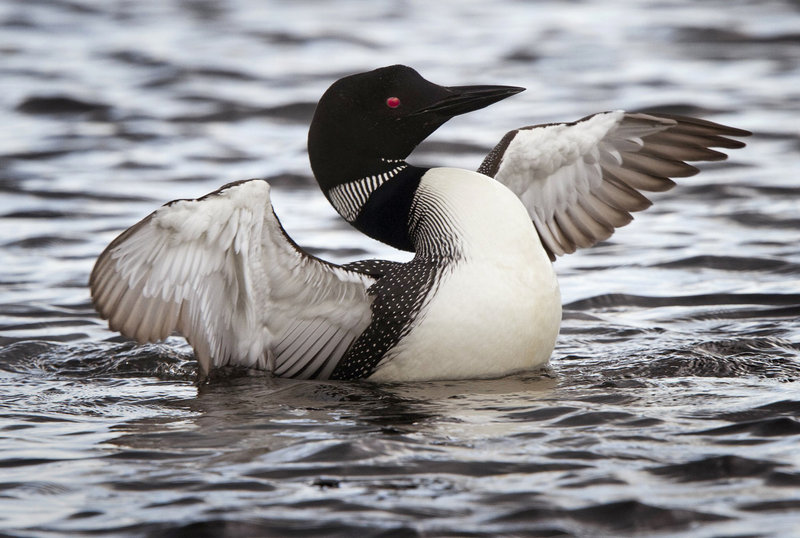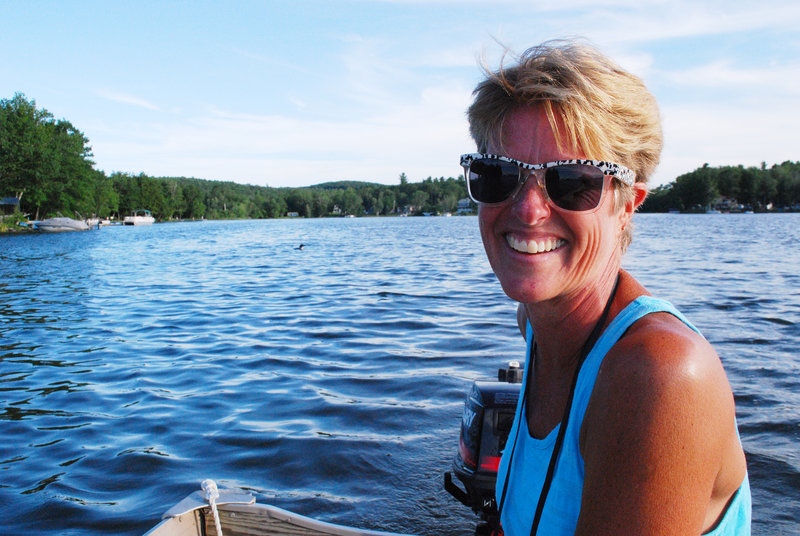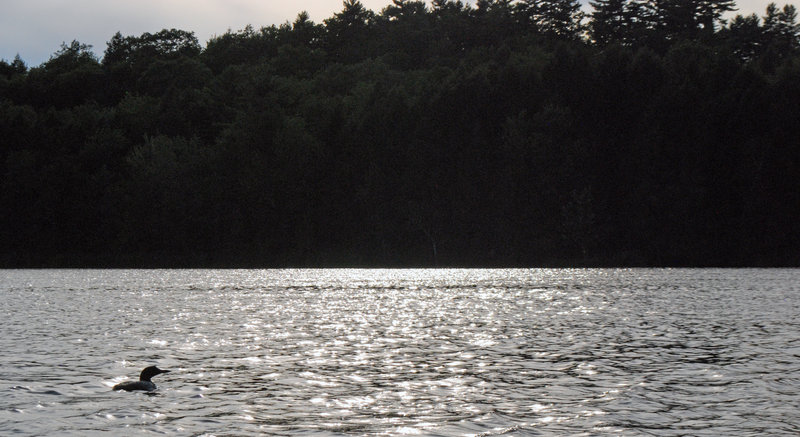MONMOUTH – Jeri Kahl doesn’t belong to any birding organizations. And Midge Burns doesn’t consider herself a birder. But both women are loon experts on their respective big-loon lakes.
Cobbosseecontee Lake, where Kahl lives, and Moose-head Lake, where Burns summers, are Maine’s top two loon lakes, according to Maine Audubon.
On the 30th anniversary of the nonprofit’s state loon count, both women had a lot to share about Maine’s prehistoric-looking bird.
With a wingspan stretching five feet and bodies up to three feet long, common loons have mesmerized humans at least for the past few centuries, and figured prominently in Native American mythology, according to the Cornell Lab of Ornithology.
And Maine is home to more nesting loons than any other New England state, said Sally Stockwell, Maine Audubon’s director of conservation.
Massachusetts only has 10 pairs; Vermont has around 100; and New Hampshire has no more than a few hundred, Stockwell said.
In contrast, last year’s loon count in Maine came in at 2,997. Of course, there are more bodies of water in Maine, at least 6,000, according to the Department of Inland Fisheries and Wildlife.
And while loon chick numbers were down last year and Stockwell said they may also be down this year, she added it could be due to the rainy spring.
However, at Maine’s two biggest loon lakes, the directors of the annual counts say loons are plentiful.
Kahl has been a loon counter, and the director of the Cobbosseecontee Lake loon count for seven years. A neighbor in her quilt class asked her if she wanted to help.
Kahl said the loons color the whole experience on the lake, where she has lived with her husband, Fred, for 37 years.
“There always have been a lot of loons all the time we’ve lived here. We’ve always tried to be respectful when they’re nesting on that island. A fisherman in a boat went out there and was fishing close. And the loon there came out and was standing up and flapping its wings, as if to say, ‘Go away, go away.’ We told him to take note,” Kahl said.
Kahl never thought of being a loon counter — she’s not a member of Maine Audubon. But without a doubt she is protective of her lake’s loons.
“When my Uncle Ralph comes to visit, he sits on the dock early in the morning and just listens to them, when three to four of them talk to each other. I think they communicate,” Kahl said.
She knows the loon’s common call, the long sustained cry; its strange laugh-like cackle, and other noises not as famous.
“They definitely communicate. At night they’re very vocal. I love to listen to them.”
At 5,000 acres, Cobbosee “is a sizable Maine lake, but not nearly the size of 29,000-acre Sebago to the south. Still Cobbosee has more loons.
Neither has as many as Moosehead, Maine’s largest lake at 75,000 acres. The 30-mile-long lake last year led all loon lakes in the Audubon count with 108.
Like Kahl, Burns is not an active birder, but the director of the Moosehead count. Burns follows the loons from the time they leave the lake in November, until she hears them migrating back in the spring, over Seneca Lake in upstate New York, where she spends the winter.
Then she gets ready to count them in the spring.
For a quarter of a century, Burns has helped count them on Moosehead, and they’ve been plentiful, she said. Most years one-day count tallies on the lake are between 70 and 100.
“We did it before anyone was doing it. We’d send it directly to Audubon. We just did it and sent stuff to Audubon,” Burns said. “I don’t see a significant difference. They seem about the same. We are never worried saying, ‘Oh, where are the loons? We hear them calling every night.”
The most faithful of loon counters, Burns admits she knows little about the loons, even though she attends lectures. The loons on Moosehead are ever-present but still something of a mystery.
“They’re usually in pairs. But the other day we saw one by himself or herself. That was interesting. The males will fight for another female but we’ve never seen it. We hear them, though. One will call right out in front of us and another will call off in the distance. But I don’t know why they’re calling,” Burns said.
Burns said she will direct Moosehead’s loon count until she turns 75 next year. After that she’ll likely still get in her canoe with her husband, John, and count them.
“I’ll do it as long as I can. People are excited about them. I like the enthusiasm,” Burns said.
Deirdre Fleming can be contacted at 791-6452 or at:
dfleming@pressherald.com
Twitter: Flemingpph
Send questions/comments to the editors.





